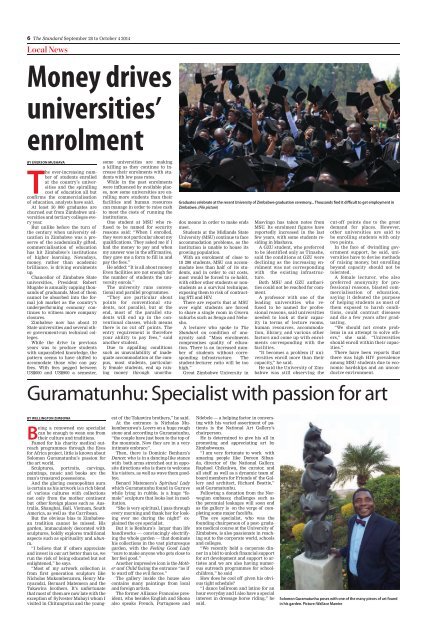Create successful ePaper yourself
Turn your PDF publications into a flip-book with our unique Google optimized e-Paper software.
6 <strong>The</strong> <strong>Standard</strong> September 28 to October 4 2014<br />
Local News<br />
Money drives<br />
universities’<br />
enrolment<br />
By EvErson Mushava<br />
<strong>The</strong> ever-increasing number<br />
of students enrolled<br />
at the country’s universities<br />
and the spiralling<br />
cost of education all but<br />
confirms the commercialisation<br />
of education, analysts have said.<br />
At least 30 000 graduates are<br />
churned out from Zimbabwe universities<br />
and tertiary colleges every<br />
year.<br />
But unlike before the turn of<br />
the century when university education<br />
in Zimbabwe was a preserve<br />
of the academically gifted,<br />
commercialisation of education<br />
has hit Zimbabwe’s institutions<br />
of higher learning. Nowadays,<br />
money, rather than academic<br />
brilliance, is driving enrolments<br />
up.<br />
Chancellor of Zimbabwe State<br />
universities, President Robert<br />
Mugabe is annually capping thousands<br />
of graduands. Most of them<br />
cannot be absorbed into the formal<br />
job market as the country’s<br />
underperforming economy continues<br />
to witness more company<br />
closures.<br />
Zimbabwe now has about 10<br />
State universities and several other<br />
government-run technical colleges.<br />
While the drive in previous<br />
years was to produce students<br />
with unparalleled knowledge, the<br />
pattern seems to have shifted to<br />
accomodate those who can pay<br />
fees. With fees pegged between<br />
US$600 and US$900 a semester,<br />
some universities are making<br />
a killing as they continue to increase<br />
their enrolments with students<br />
with low pass rates.<br />
While in the past enrolments<br />
were influenced by available places,<br />
now some universities are enrolling<br />
more students than their<br />
facilities and human resources<br />
can manage in order to raise cash<br />
to meet the costs of running the<br />
institutions.<br />
One student at MSU who refused<br />
to be named for security<br />
reasons said: “When I enrolled,<br />
they were not particular about my<br />
qualifications. <strong>The</strong>y asked me if I<br />
had the money to pay and when<br />
my answer was in the affirmative,<br />
they gave me a form to fill in and<br />
pay the fees.”<br />
He added: “It is all about money.<br />
Even facilities are not enough for<br />
the number of students the university<br />
enrols.”<br />
<strong>The</strong> university runs conventional<br />
and parallel programmes.<br />
“<strong>The</strong>y are particular about<br />
points for conventional students,<br />
not parallel, but at the<br />
end, most of the parallel students<br />
will end up in the conventional<br />
classes, which means<br />
there is no cut off points. <strong>The</strong><br />
entry requirement is therefore<br />
your ability to pay fees,” said<br />
another student.<br />
Due to appalling conditions<br />
such as unavailability of inadequate<br />
accommodation at the campus,<br />
most students, particularly<br />
female students, end up raising<br />
money through unortho-<br />
Graduates celebrate at the recent University of Zimbabwe graduation ceremony... Thousands find it difficult to get employment in<br />
Zimbabwe. (File picture)<br />
dox means in order to make ends<br />
meet.<br />
Students at the Midlands State<br />
University (MSU) continue to face<br />
accommodation problems, as the<br />
institution is unable to house its<br />
growing population.<br />
With an enrolment of close to<br />
18 298 students, MSU can accommodate<br />
less than half of its students,<br />
and in order to cut costs,<br />
most would be forced to co-habit,<br />
with either other students or nonstudents<br />
as a survival technique,<br />
exposing them to risk of contracting<br />
STI and HIV.<br />
<strong>The</strong>re are reports that at MSU<br />
over eight students are forced<br />
to share a single room in Gweru<br />
suburbs such as Senga and Nehosho.<br />
A lecturer who spoke to <strong>The</strong><br />
<strong>Standard</strong> on condition of anonymity<br />
said: “Mass enrolments<br />
compromises quality of education.<br />
<strong>The</strong>re is an increased number<br />
of students without corresponding<br />
infrastructure. <strong>The</strong><br />
student-lecturer ratio will be too<br />
high.”<br />
Great Zimbabwe University in<br />
Masvingo has taken notes from<br />
MSU. Its enrolment figures have<br />
reportedly increased in the last<br />
few years, with some students residing<br />
in Mashava.<br />
A GZU student, who preferred<br />
to be identified only as Tinashe,<br />
said the conditions at GZU were<br />
declining as the increasing enrolment<br />
was not corresponding<br />
with the existing infrastructure.<br />
Both MSU and GZU authorities<br />
could not be reached for comment.<br />
A professor with one of the<br />
leading universities who refused<br />
to be named for professional<br />
reasons, said universities<br />
needed to look at their capacity<br />
in terms of lecture rooms,<br />
human resources, accommodation,<br />
library, and various other<br />
factors and come up with enrolments<br />
corresponding with the<br />
facilities.<br />
“It becomes a problem if universities<br />
enroll more than their<br />
capacity,” he said.<br />
He said the University of Zimbabwe<br />
was still observing the<br />
cut-off points due to the great<br />
demand for places. However,<br />
other universities are said to<br />
be enrolling students with only<br />
two points.<br />
In the face of dwindling government<br />
support, he said, universities<br />
have to devise methods<br />
of raising money, but enrolling<br />
beyond capacity should not be<br />
tolerated.<br />
A female lecturer, who also<br />
preferred anonymity for professional<br />
reasons, blasted commercialisation<br />
of education,<br />
saying it defeated the purpose<br />
of helping students as most of<br />
them exposed to harsh conditions,<br />
could contract diseases<br />
and die a few years after graduating.<br />
“We should not create problems<br />
in an attempt to solve others,”<br />
she said. “Universities<br />
should enroll within their capacities.”<br />
<strong>The</strong>re have been reports that<br />
there was high HIV prevalence<br />
among MSU students due to economic<br />
hardships and an unconducive<br />
environment.<br />
Guramatunhu: Specialist with passion for art<br />
By WELLInGTon ZIMBoWa<br />
Being a renowned eye specialist<br />
can be enough to wean one from<br />
their culture and traditions.<br />
Famed for his charity medical outreach<br />
programmes through the Eyes<br />
for Africa project, little is known about<br />
Solomon Guramatunhu’s passion for<br />
the art world.<br />
Sculptures, portraits, carvings,<br />
paintings, music and books are the<br />
man’s treasured possessions.<br />
And the glaring cosmopolitan aura<br />
is certain as his artwork is a rich blend<br />
of various cultures with collections<br />
not only from the mother continent<br />
but other foreign places such as Australia,<br />
Shanghai, Bali, Vietnam, South<br />
America, as well as the Carribean.<br />
But the obvious bias to Zimbabwean<br />
tradition cannot be missed. His<br />
garden, immaculately decorated with<br />
sculptures, boldly explores traditional<br />
aspects such as spirituality and ubuntu.<br />
“I believe that if others appreciate<br />
and invest in our art better than us, we<br />
run the risk of being educated but not<br />
enlightened,” he says.<br />
“Most of my artwork collection is<br />
from first generation sculptors like<br />
Nicholas Mukomberanwa, Henry Munyaradzi,<br />
Bernard Matemera and the<br />
Takawira brothers. It’s unfortunate<br />
that most of them are now late with the<br />
exception of Sylvester Mubayi whom I<br />
visited in Chitungwiza and the youngest<br />
of the Takawira brothers,” he said.<br />
At the entrance is Nicholas Mukomberanwa’s<br />
Lovers on a huge rough<br />
stone and according to Guramatunhu,<br />
“the couple have just been to the top of<br />
the mountain. Now they are in a very<br />
intimate embrace”.<br />
<strong>The</strong>n, there is Dominic Benhura’s<br />
Dancer, who is in a dancing-like stance<br />
with both arms stretched out in opposite<br />
directions who is there to welcome<br />
his visitors, as well as wave them goodbye.<br />
Benard Matemera’s Spiritual Lady<br />
which Guramatunhu found in Guruve<br />
while lying in rubble, is a huge “female”<br />
sculpture that looks lost in meditation.<br />
“She is very spiritual, I pass through<br />
every morning and thank her for looking<br />
over me during the night!” explained<br />
the eye specialist.<br />
But it is Benhura’s larger than life<br />
handiworks — convincingly electrifying<br />
the whole garden — that dominate<br />
his collections in the vast picturesque<br />
garden, with the Feeling Good Lady<br />
“sure to make anyone who gets close to<br />
her feel good.”<br />
Another impressive icon is the Mother<br />
and Child facing the entrance “as if<br />
to ward off the evil forces.”<br />
<strong>The</strong> gallery inside the house also<br />
contains many paintings from local<br />
and foreign artists.<br />
<strong>The</strong> former Alliance Francaise president,<br />
who besides English and Shona<br />
also speaks French, Portuguese and<br />
Ndebele — a helping factor in conversing<br />
with his varied assortment of patients<br />
is the National Art Gallery’s<br />
chairperson.<br />
He is determined to give his all in<br />
promoting and appreciating art by<br />
Zimbabweans.<br />
“I am very fortunate to work with<br />
amazing people like Doreen Sibanda,<br />
director of the National Gallery,<br />
Raphael Chikukwa, the curator, and<br />
all staff as well as a dynamic team of<br />
board members for Friends of the Gallery<br />
and architect, Richard Beattie,”<br />
said Guramatunhu.<br />
Following a donation from the Norwegian<br />
embassy, challenges such as<br />
the perennial leakages will soon end<br />
as the gallery is on the verge of completing<br />
some major facelifts.<br />
<strong>The</strong> eye specialist, who was the<br />
founding chairperson of a post- graduate<br />
medical course at the University of<br />
Zimbabwe, is also passionate in reaching<br />
out to the corporate world, schools<br />
and colleges.<br />
“We recently held a corporate dinner<br />
in a bid to unlock financial support<br />
for art development and support to artistes<br />
and we are also having numerous<br />
outreach programmes for schoolchildren,”<br />
he said<br />
How does he cool off given his obvious<br />
tight schedule?<br />
“I dance ballroom and latino for an<br />
hour everyday and I also have a special<br />
interest in dressage horse riding,” he<br />
said.<br />
Solomon Guramatunhu poses with one of the many pieces of art found<br />
in his garden. Picture: Wallace Mawire

















